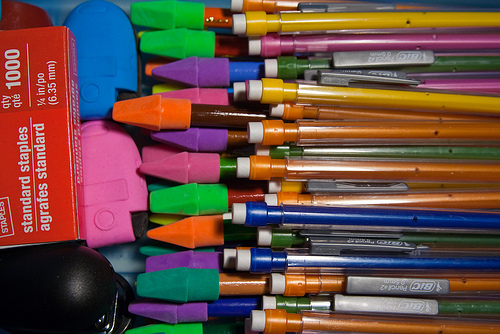In 2012, we explored many ways to bring calm and joy into our lives. Here is a recap of some of our favorite tools to help us lead a more stress-free, joy-filled and meaningful life.
1. Breathe Deeply
That's our story and we are sticking to it - one of the simplest and most effective ways to calm down is through simple mindful breathing exercises. The simple act of taking a few long, deep breaths can work wonders on your body and your mind. Research has shown that the simple act of breathing deeply and fully can stop the release of stress hormones in the body and allow physical and neurological function to be restored to a normal state. Breathing deeply and mindfully helps stimulate the parasympathetic nervous system which triggers this relaxation response. By focusing your attention on your breath, you will also slow down the tornado of thoughts spinning around in your mind. So, try to stop for a minute or two each day, close your eyes and breathe deeply, inhaling fully through your nose and filling your lungs and belly as you inhale. Then, empty your chest and abdomen completely as you exhale. Repeat for a few minutes in the morning or throughout the day to find a bit of space, calm and relaxation wherever you are. Try it with your children and you will be teaching them a valuable way to calm themselves down in any stressful situation. It even helps at night to relax and unwind before bedtime, and get a better night sleep. So, in 2013, keep breathing deeply!
2. Do An Act of Kindness
Little acts of kindness not only brighten other people’s days, but can go a long way in increasing your own happiness. The new and emerging science of positive psychology, the study of happiness, shows that we can increase our own sense of wellbeing by making other people happy. So, share a smile with a stranger, help someone open a door, offer a helping hand to someone in need, and you will feel a wonderful sense of connection and joy.
3. Practice Mindful Listening
Often when we lend an ear to a child or a friend, we are in problem solving mode. We are analyzing, judging, or trying to fix something most of the time we are listening. The truth is that people just want to be heard and feel listened to. So, try some mindful listening by saying little, by looking into the other person’s eyes and by giving them your full attention - no texting, e-mailing or other distractions allowed. We all know that frustrating feeling when we are speaking and we can actually feel that the other person is not really listening to us. Rather, be a compassionate and fully present listener. What a wonderful gift to give a child, parent or friend. In doing so, you are also modeling mindful listening and may reap the benefits of that person learning to give you their full attention in return.
4. Think of Something You Did Well Each Day
At the end of each day, we often go through a list of all that we failed to accomplish and all that we did not do well. Instead, at the end of each day, make a list of all that you did right. We need to take the time to recognize and appreciate all that we accomplish each day, big or small. Whether it is taking some much needed time for ourself, making sure our children are clothed and fed, calling a friend that we haven’t spoken to in a while, or completing a project at work, we need to appreciate our efforts and recognize our worth. We may feel we are in a “thankless” job or situation, but the truth is there is great value in thanking ourselves on a job well done. So, each night make sure to think about something you did well each day – you deserve it!
5. Take Time for Yourself
As we mentioned in one of our first blogs, it is so important to put your own oxygen mask on first. We cannot find peace and calm in the world around us if we are not peaceful and calm ourselves. We cannot expect our children to be relaxed and joyful if we don’t model that behavior. So, it is essential to take a time out and make time for yourself. In the end, it is not only a wonderful opportunity to connect with yourself, but it will pay off many times over in how you interact with the world around you.
6. Keep a Gratitude Journal
We often get stuck in the monotony of our daily schedules and forget to take note of the extraordinary gifts we have in our lives. One way to get out of this rut, is to buy a small notebook and create a Gratitude Journal. This can be a personal journal or you can create a family gratitude journal, in which each member of the family can jot done one thing he or she is grateful for each day. You can also make this a family routine during dinner, with each person reflecting on something good that happened that day. Research has shown that by simply recalling a positive experience our bodies release pleasure hormones, which can give us an increased overall feeling of wellbeing.
7. Unplug
It is increasingly apparent that we are becoming a society addicted to our electronic devices, unable to go for 60 seconds without checking our e-mails, voicemails or texts. In 2013, challenge yourself to "unplug" for at least 30 minutes each the day, and during mealtimes. Make “screen free” time in which you turn off your devices, phones and computers. Although these are valuable tools in our modern world, they are also a source of distraction, increased stress, and huge energy zappers because they take us away from where we are and who we are with. Checking our messages while engaged in a conversation with someone sends a strong message to those we are with that they are not important or worthy of our attention. We must be mindful as well of the example we are setting for our children as we constantly check our devices while we are at a stoplight, while they are talking to us or during mealtime. We can’t ask them to unplug if we are not willing to do the same. So, take time each day to power off, so you can tune in and be fully present in the moment, before those moments pass you by.
8. Look into their Eyes
We have all heard that the Eyes are the Windows to the Soul. Try it out and see for yourself. Make a point of looking into the eyes of the person you are with. When saying “Good Morning” or “Thank you” to people throughout the day, look into their eyes and see if you notice a difference in how it feels. You can establish a much greater connection to the people around you by taking the time to stop and notice them by looking into their eyes. So often these days we are so busy doing other things, that we don’t take a few seconds to truly acknowledge the people around us. Try it and you will see that you can enrich your everyday experiences with your children, your colleagues and even total strangers by simply taking a brief moment to truly notice them.
9. Take a Walk in Nature
Enjoying nature is a great way to take a much-needed break in our busy, hectic lives. It offers us the opportunity to slow down, breathe deeply and clear our minds. When taking a walk, running, hiking, or walking the dog, try to be fully present where you are, rather than solve problems, make mental lists or think about your busy schedule, which takes you somewhere else. Use this time to clear your thoughts, appreciate where you are at that moment, and connect to the beautiful world around you.
10. Practice Acceptance
In 2012, we wrote about Letting Go of Expectations. The flip side of that lesson is to practice acceptance. Life is a roller coaster ride, full of ups and downs, great joys and great disappointments. If we can learn to accept that life is not perfect, we are not perfect, those around us are not perfect and we embrace those imperfections and accept people and situations as they are, life becomes much easier. We can learn to accept ourselves and the people in our lives for who they are, not who we want them to be. In doing so we learn to embrace and appreciate ourselves and others with an open heart and mind.



















